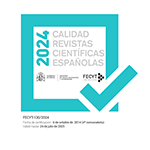La expresión de la idea de “problema” en el latín de Plauto. Análisis de Semántica Cognitiva
Resumen
What is a problem in Latín? How do we express this concept? We have not found any specific word to express what is aproblem ¡n the LatinofPlautus. In contrast, this Latin makes use of several words and expresions that reflect our experience of a problem as a thing that falls on us, a place without exit, a thing that does not move, an obstacle in our way, or a knot. The aim of this paper is to consider what is a problem in Latín from a cognitive perspective. We shall study etymologies of latin words for “problem’ and “solution” and usual expressions such as haeret haec res, or vadum salutis, where it is possible to find Source Domains (places, exits...) by which Abstract Concepts can be established as Target Domains to express the complex concept of problem, according to spatial and ontological metaphors.Descargas
Descarga artículo
Licencia
La revista Cuadernos de Filología Clásica. Estudios Latinos, para fomentar el intercambio global del conocimiento, facilita el acceso sin restricciones a sus contenidos desde el momento de su publicación en la presente edición electrónica, y por eso es una revista de acceso abierto. Los originales publicados en esta revista son propiedad de la Universidad Complutense de Madrid y es obligatorio citar su procedencia en cualquier reproducción total o parcial. Todos los contenidos se distribuyen bajo una licencia de uso y distribución Creative Commons Reconocimiento 4.0 (CC BY 4.0). Esta circunstancia ha de hacerse constar expresamente de esta forma cuando sea necesario. Puede consultar la versión informativa y el texto legal de la licencia.








